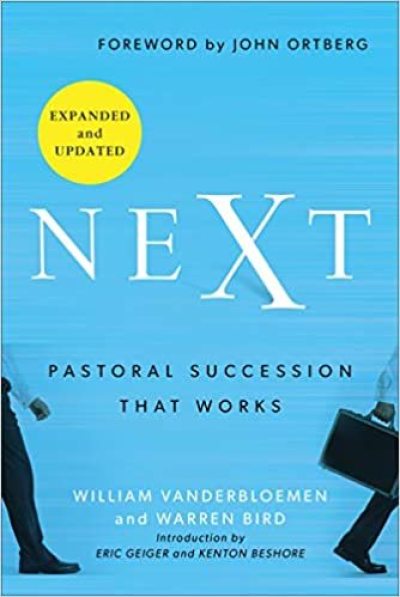10 Indicators that it's time to move on
Brett Favre is one of the most decorated quarterbacks in NFL history. His legacy is largely defined by gritty, gutsy play. That kind of courage and the confidence that comes with it are a big part of what made Brett Favre one of the best.

But his legacy is now also defined by his inability to recognize when it was time to move on. When it came time to find a new future, Brett didn’t end well. He retired, then unretired several times. He kept believing that he had one more year in him, even when his body and performance clearly told him otherwise. His series of transitions was so tragic that it even became the butt of late-night television jokes.
What does Brett Favre have to do with pastoral succession, including those who are still far from actual retirement?
A person’s greatest strength, when unguarded, can become that same person’s greatest weakness. And Favre’s story, like that of so many other aging athletes who stay one too many seasons, is played out in churches by highly competent pastors far too often. In ministry, a pastor’s confidence — one of the qualities God uses to build a church — can become one of the biggest obstacles to pastoral succession. The very voice of confidence that overcomes a fear of public speaking and enables a pastor for years to get up in front of the congregation and boldly proclaim God’s Word — that voice, if unchecked, can also whisper in the pastor’s ear, “You’ve got another good year or two in you.”

The voice may have many different translations: “Stay, because this church still needs you,” or “You’ve been here so long that you can do things a newcomer couldn’t,” or even “This church owes a great debt to you that you need to receive and cherish here.”
And so begins the far-too-often-played story of the pastor who keeps hanging on long after the vision and energy for the current ministry are gone, long after the community around the church has changed, or long after the congregation has stagnated.
No pastor wants that for a legacy. No pastor wants to be the leader who walks out of a meeting only to be the subject of the next conversation that centers around, “How do we tell Pastor that we think it’s time to consider a change?”
So how do you know when your time has come to let go?

If your succession is one you can plan and have some control over, these 10 indicators might help you know when it is the right time to leave.
1. God gives you a clear sign. This may range from Scripture that comes alive to a vision or dream. Sometimes compelling circumstances serve as a divine sign, such as a financial situation becoming unworkable or unsustainable for you or your family.
2. Your leadership speaks. Your spiritual authority may be a denominational superintendent or bishop or the governance board at your church.
3. Your part of the mission is complete. You have fulfilled what God originally called you to do, and God has not extended or enlarged the challenge.
4. You lose heart. The passion or other spiritual fire you once knew for this church and situation has clearly departed (and hopefully you are now sensing in its place a big heart for another location or ministry).
5. Others confirm it. Your close friends or other trusted advisers affirm that your time at this church is finished.
6. You receive a new call. This may start in your heart or in an actual invitation from another church or ministry.
7. A mismatch develops. You can no longer reach those your church needs to reach, such as a certain age group, economic level, lifestyle or racial demographic. Perhaps the church’s vision has shifted, and you can no longer align with it.
8. Collaboration ends. The place you serve becomes more of an enemy than your ally. Or perhaps your family is experiencing deep pain because of your present environment.
9. The church begins to show a lack of confidence in your vision and/or leadership. Attendance may decline or plateau. Perhaps the church has potential to go forward in its mission, but you don’t seem to be the right one to provide the leadership training and outreach the church needs for its next chapter.
10. You reach physical or emotional limits. You no longer have the physical strength, mental quickness, or physical agility to do the job needed.
Next Steps
For Pastors and Christian Leaders: Read through the 10 indicators of succession. Do any of them resonate with your current situation? How many? How do you think you can start to address those warning signs?
For Boards: What two indicators stand out as the clearest danger to your current pastorate? Name three tangible steps that can be taken over the next 90 days to help solve the problems before they worsen.
Adapted from NEXT: PASTORAL SUCCESSION THAT WORKS, EXPANDED AND UPDATED. Copyright © 2020 by William Vanderbloemen and Warren Bird. Published by Baker Books, a division of Baker Publishing Group.
ABOUT NEXT: PASTORAL SUCCESSION THAT WORKS, EXPANDED AND UPDATED
Packed with new research, new interviews and practical solutions, this updated and expanded edition of Next: Pastoral Succession That Works will equip pastors, ministry teams, and Christian organizations to navigate leadership changes with wisdom and grace. Next is available from booksellers everywhere. For more information, or to order your copy, go to vanderbloemen.com.
ABOUT WILLIAM VANDERBLOEMEN
William Vanderbloemen (MDiv, Princeton Theological Seminary) served for 15 years as a pastor before founding Vanderbloemen, the leading search firm specifically focused on succession planning and connecting churches and Christian organizations with the right leadership for their teams.
ABOUT WARREN BIRD
Warren Bird (Ph.D., Fordham University) is vice president of research for the Evangelical Council for Financial Accountability (ECFA.org). An ordained minister and former seminary professor, he is also author or co-author of 31 books, including How to Break Growth Barriers. He and his wife, Michelle, live in a suburb of New York City.





















